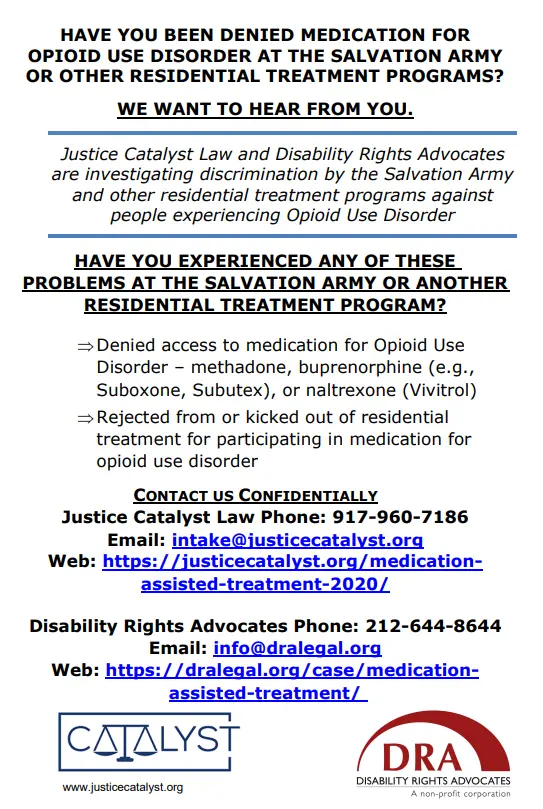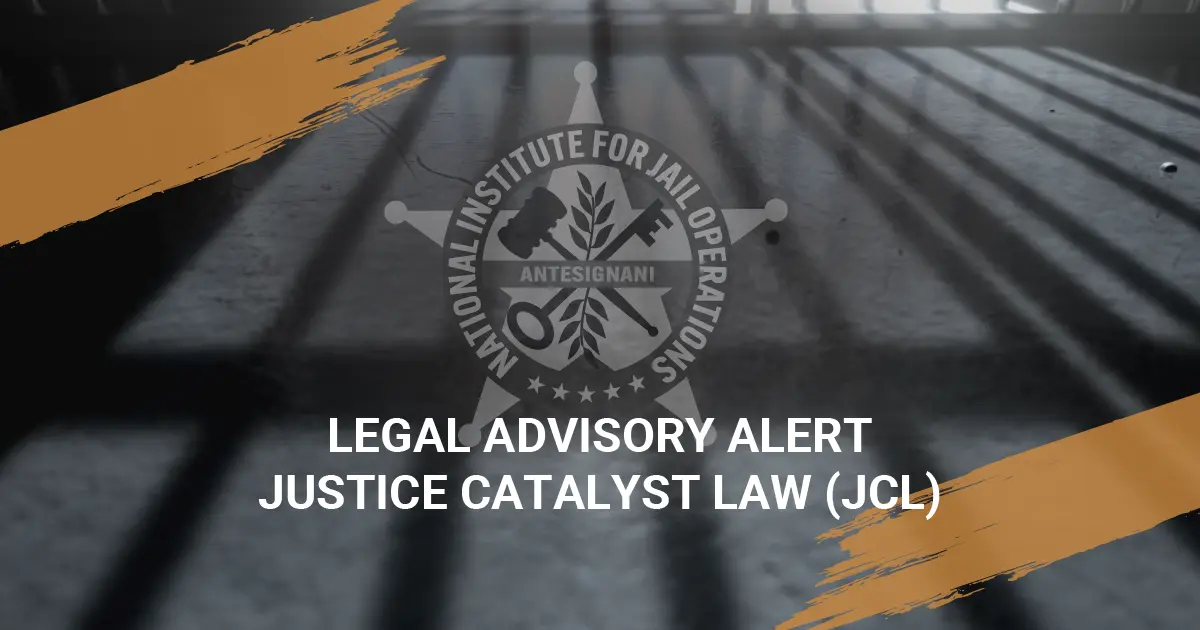June 23, 2022
BACKGROUND.
An organization called Justice Catalyst Law (JCL) has sent a letter dated May 4, 2022 via certified mail to corrections facilities across the nation. The letter is entitled, “Access to and Non-Discrimination for Medication for Opioid Use Disorder” and attaches recommendations issued by the United States Department of Justice, Civil Rights Division, that focuses on Americans with Disabilities Act (ADA) protections to be afforded the use of medication for opioid use disorder (MOUD) and medication-assisted treatment (MAT).
In partnership with the Western States Sheriffs’ Association, the National Institute for Jail Operations (NIJO) began analyzing the JCL’s background, intentions, letter contents and distribution patterns, and is analyzing potential outcomes which might affect the operations, policy, and potential litigation liability exposure for corrections agencies across the country.

RESEARCH.
NIJO has determined that JCL is a non-profit organization based out of New York City, founded in 2018. In the last three months, JCL has made substantial upgrades and website changes which suggests significant organizational growth and funding sources. JCL is also recruiting young activist lawyers from all over the country to participate in “fellowships.”
- The JCL website mission statement touts that JCL “activates path-breaking approaches to social justice lawyering that have real-world impact and improve the lives of those denied access to justice. JCL’s work emphasizes the commercial and private rights violations that underlie systemic social and economic injustice.” In addition to their recent MAT opioid focus, other
identified JCL social and legal action pertinent to our profession includes social and legal action to combat the public posting of criminal records, end excessive inmate telephone call rates, rally the call to end corrections agencies partnership with private prisons and detention centers, increase lawsuits against DOCs and jails who use defective and faulty drug tests, and champion antitrust action against fixed premium commercial bail bonds.
- JCL has filed class action lawsuits against multiple organizations including the Salvation Army alleging discriminatory denial of medication for opioid use disorder (OUD) in violation of the ADA and the Rehabilitation Act. These lawsuits appear to strategically target organizations located in more liberal circuit courts such as CA1 (Massachusetts 1:21-cv-10806), CA7 (Illinois
1:21-cv-06105), and CA9 (California).
Tassinari v. The Salvation Army National Corporation et al., No. 21 Civ. 10806 (D. Mass.), (filed May 14, 2021) has potential outcome applicability to jails and detention facilities where like the Salvation Army residential programs, jails and detention centers serve populations with an increasing incidence of OUD. The use of MAT varies among facilities based on community resources, staffing, and budgets. The case is currently being litigated and is certainly one to watch.
CONSIDERATIONS.
A certified mail letter is not sent unless the sender is seeking documentation of confirmed receipt. NIJO legal advisor and nationally respected corrections defense attorney, Rachel Love, opined that the mass certified mail campaign may be used by JCL in future litigation to allege that the particular facility at issue was put “on notice” of the applicability of the ADA and Rehabilitation Act protections to denial of access to MAT, yet failed to take action to implement MAT to assist the facility’s
population suffering from OUD. If JCL gets traction from its pending litigation either through favorable court rulings or settlement, lawsuits against jails will likely follow. As such, the following considerations may be useful:
- Do not respond directly to JCL about this letter or future correspondence, unless your legal counsel advises otherwise as such communications may be construed as fact or liability admissions in future litigation.
- Take a proactive opportunity to explore available MAT resources. Be aware of the hurdles and restrictions of a MAT program.
- Know the ADA and the Rehabilitation Act requirements, protections, and exemptions. DOJ Civil Rights Division self-produced recommendations do neither set constitutional minimum nor constitute legal precedence.
- As with any policies regarding the delivery of medical care, blanket policies restricting certain care protocols may not be defensible. Generally, the provision of medical are to individuals with OUD should be considered on a case-by-case basis.
- Arrestees with OUD should be given a thorough medical intake assessment, document the use disorder observations, causes and effects, and advise medical staff of these issues. In accordance with the ADA exemption, document the use of illegal drugs.
- Follow medical staff’s orders; however, administrators should consider the penological interests to protect the inmate by maintaining safety, security, order, and discipline throughout the facility.
AVAILABLE RESOURCES.
- Department of Health and Human Services (HHS) SAMHSA MAT Grant information.
- The National Health Law Program released an article on February 8, 2022 titled “Eliminating Barriers to Medication-Assisted Treatment in Medicaid” describing the Support ACT enacted in October 2018 (effective Oct. 2020).
- Penn LDI, Leonard Davis Institute of Health Economics, wrote an article titled “Lowering the Barriers to Medication Treatment for People with Opioid Use Disorder.“
- NIJO Legal-Based Jail GuidelinesTM (Section O: Americans With Disabilities Act).




